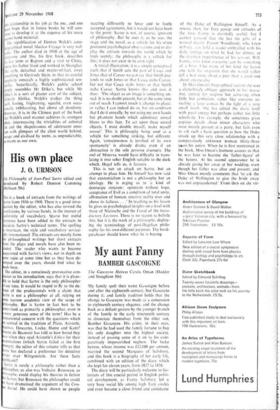His own place
J. 0. URMSON
The Philosophy of Jean-Paul Sartre edited and introduced by Robert Denoon Cumming (Methuen 50s) This is a book of extracts from the writings of Sartre from 1936 to 1960. There is a good intro- action by the editor, who has also revised the translations, by various hands, in the interest of niformity of vocabulary. Sparse but useful ootnotes have been added to the extracts -to ucidate Sartre's technical terms. The spelling American, the style and vocabulary service- bly international. The extracts are mostly from philosophical writings but short extracts ram the plays and novels have also been in- laded. The reader who wants to become cquainted with Sartre's views, not in depth on me topic at some time but as they have de- oped over the years, should find what he gds here.
The editor, in a consciously provocative con- lusion to his introduction, says that it is plans- ble to hold that Sartre is the only philosopher f our time. It would be stupid to fly to the de- ence of the professionals with a claim that rtre is not a philosopher at all, relying on me narrow academic view of the scope of hilosophy. But is Sartre in fact best to be nderstood as primarily a philosopher, even in more generous sense of the term? Has he a Momenta] concern with the questions which e central in the tradition of Plato, Aristotle, quinas, Descartes, Locke, Hume and Kant? mone de Beauvoir has told us how bored they ere when they read Aristotle's Ethics for their aminations (which Sartre failed at the first tempt); the editor of this volume tells us that rtre has declared a preference for detective ories over Wittgenstein. Are these facts gnificant?
Sartre is surely a philosophe rather than a hilosopher, as also was Voltaire. Rousseau, as hilosophe, could display his theories in fiction e Sartre; but Rousseau the philosopher could have dramatised the argument of the Con- Social. He could have shown us people
reacting differently to force and to freely accepted agreements, but it would not have been
to the point. Sartre is not, of course, ignorant
of philosophy. But he uses it, as he uses the stage and the novel, as a vehicle for his often profound psychological observations and to dis- play the attitude towards the world which he finds seemly; the philosophy is a vehicle for this; it does not exist in its own right.
A trivial illustration; it is a simple conceptual truth that if Smith acts the part of Casco and Jones that of Caesar we can say that Smith pre- tends to stab Jones or that Casco stabs Caesar, but not that Casca stabs Jones or that Smith stabs Caesar. Sartre knows this and uses it thus: 'The object as an image is something un- real. It is no doubt present, but at the same time out of reach. I cannot touch it, change its place; or rather I can indeed do so, but on condition that I do it unreally, by not using my own hands but phantom hands which administer unreal blows to this face. To act upon these unreal objects, I must double myself, make myself unreal.' This is philosophy being used as a vehicle for something striking, but different. Again, 'consciousness is terrified of its own spontaneity' is already drama even if an abstraction is the sole persona dramatis. The owl of Minerva would have difficulty in trans- lating it into sober English suitable to the dusk which, Hegel tells us, it favours.
This is not an attack on Sartre, but an attempt to place him. He himself has now said that existentialism is not a philosophy but an ideology. He is urging us to 'a kind of demiurgic stoicism: optimism without hope, acceptance of Evil as a condition of total unity, affirmation of human, creative reality over and above its failures... .' In teaching us his lesson he gives us psychological insights on a level with those of Nietzsche and the Freud of the Intro- ductory Lectures. There is no reason to belittle this; but it is the work of a philosophe, deploy- ing the terminology of post-Hegelian philo- sophy for his own different purposes. The book- purchaser should know what he is buying.






































 Previous page
Previous page